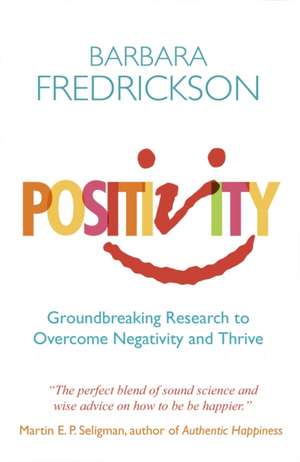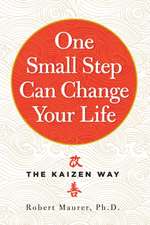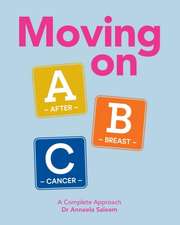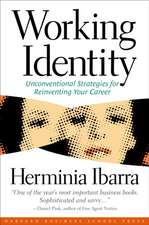Positivity
Autor Barbara Fredricksonen Limba Engleză Paperback – 2011
One of the leading members of the positive psychology movement draws on cutting-edge research and lab-tested tools to explain:
• Why positivity is more important than happiness
• How it relieves depression, broadens minds, and builds lives
• How to tap into your own sources of positivity
With Positivity, you’ll learn to see new possibilities, bounce back from setbacks, connect with others, and become the best version of yourself.
| Toate formatele și edițiile | Preț | Express |
|---|---|---|
| Paperback (2) | 58.97 lei 3-5 săpt. | +12.77 lei 6-10 zile |
| Oneworld Publications – 2011 | 58.97 lei 3-5 săpt. | +12.77 lei 6-10 zile |
| Three Rivers Press (CA) – 30 noi 2009 | 95.64 lei 3-5 săpt. |
Preț: 58.97 lei
Nou
Puncte Express: 88
Preț estimativ în valută:
11.28€ • 11.66$ • 9.39£
11.28€ • 11.66$ • 9.39£
Carte disponibilă
Livrare economică 26 februarie-12 martie
Livrare express 11-15 februarie pentru 22.76 lei
Preluare comenzi: 021 569.72.76
Specificații
ISBN-13: 9781851687909
ISBN-10: 1851687904
Pagini: 288
Dimensiuni: 131 x 201 x 27 mm
Greutate: 0.31 kg
Editura: Oneworld Publications
ISBN-10: 1851687904
Pagini: 288
Dimensiuni: 131 x 201 x 27 mm
Greutate: 0.31 kg
Editura: Oneworld Publications
Notă biografică
BARBARA L. FREDRICKSON, PH.D., is Kenan Distinguished Professor of Psychology and principal investigator of the Positive Emotion and Psychophysiology Laboratory at the University of North Carolina at Chapel Hill. She is a leading scholar within social psychology, affective science, and positive psychology.
From the Hardcover edition.
From the Hardcover edition.
Extras
Chapter 1
Waking Up to Positivity
One’s own self is well hidden from one’s own self:
Of all mines of treasure, one’s own is the last to be dug up.
—Friedrich Nietzsche
TAKE 1
The morning sun streams through your bedroom window and wakes you from a fitful night’s sleep. After a long string of gray and rainy days, you appreciate seeing blue sky. But soon enough you realize the alarm didn’t go off. You’re disappointed because you’ve been meaning to wake up extra early so you can have time to yourself before the kids wake up and the morning race begins. With what little time there is, you decide to skip your planned exercise routine, spend some more time in bed, and write in your journal. You write,
I can’t believe I let myself down again by forgetting to set my alarm. How am I ever going to take charge of my days (and my
life!) if I can’t make this simple change? Without exercise, I’m going to feel like a slug today. Ugh. I’d better focus on why I write in this journal in the first place: to think about my larger goals and connect them to what I do each day. Is this really working? Is it worth my time when I could be sleeping? What I really should be doing with this extra time is checking for fires on e- mail or reviewing my ridiculously long to- do list. Isn’t our water bill past due? Where is it anyway?
At this point you close your journal, get out of bed, go to your computer, and open your e- mail. Sure enough, you find that your co- worker, Sharon, needs input from you before she can submit her proposal, and she needs it by this afternoon. You’ll be stuck spending at least part of your morning preparing forms for her. Feeling angry at her imposition, you open the next e-mail to see that the project you spearheaded received preliminary approval and you’ve got forty- eight hours to make a final set of revisions. “ Fortyeight hours!” you say out loud. “Am I supposed to drop everything to make these revisions?” How am I going to fit this in?” The nanosecond of joy you felt on learning the good news is squashed by your concerns about clearing this last hurdle.
Just then, your daughter, who’s nearly four years old, wakes up and calls, “Mommy!” You glance at the time: 6:42. You’ve told her time and again to wait quietly in her room until you come in for hugs and kisses at seven, and here she is, not listening, again. Your frustration is growing— far too many demands both at work and at home. Nobody understands how impossible your life has become with this career shift. You go to your daughter’s room, snap at her
about calling for you early, and then march off to make breakfast.
The whole morning is a grim race, and everybody’s losing. You’d have been out the door on time had your seven- year- old son not misplaced his favorite shoes. Then starts the parental nagging: “Why can’t you just wear a different pair!? If those shoes are so important to you, why don’t you keep better tabs on them?” Now all four of you— the kids, you, and your husband— are racing around the house trying to find those @#$% shoes!
Later, having dropped the children off at school— late again—you arrive at work— also late. The first person you see is Joe, your collaborator on the project that was just accepted. He’s smiling broadly. At times you appreciate Joe’s good spirits, but today his smile makes you suspicious. You think, He’s trying to butter me up so I’ll do all the revisions! He approaches. “Did you hear the news? We got the money! We’re set for the year!” You say, “Yeah, but did you see that list of revisions— and just forty- eight hours to make them? I’ve also got to deal with Sharon’s proposal this morning.” Joe’s smile fades as he takes a moment to figure out how to respond to your negativity.
***
Sound familiar? If you’re like most people, you probably recognize this kind of morning all too well: Can’t do anything right. Can’t give myself the time I need. Can’t stick with my goal of journaling. Can’t stand that Sharon is making her emergency my emergency. Can’t fathom how I’ll meet a forty- eight- hour revision deadline. Can’t get on the same page with Joe. Can’t even teach my kids to stay in bed until 7:00 a.m. Can’t get through the morning “race” without yelling and fussing. Can’t get the kids to school on time. And if I can’t get myself to work on time—how in the world am I going to meet all these demands?
We all know negativity; it looms large and is easy to spot. Negativity pervades your self- talk and your judgments. It bleeds into your exchanges with your kids and your colleagues, eroding goodwill between you. Making matters worse, unchecked negativity breeds healthdamaging negative emotions— anger, contempt, and depression— that seep into your entire body. You can feel your simmering bitterness eating away at your stomach, raising your blood pressure, and turning your shoulder and neck muscles to stone. Even your face feels hard and tight, which may be why others steer clear if they can. What’s more, you move through your day as if you have blinders on. You find fault and blame everywhere. You see no solutions. Everything is painfully predictable. Negativity comes on fast and strong, hitting like a sledgehammer. And none of us is immune to it.
So what about positivity? Compared to negativity, positivity seems pale and weak. It’s hardly the mirror image of negativity. Positivity seems so puny that at times we don’t even notice it.
But what if positivity matters?
And what is positivity anyway?
Let’s start with what it isn’t. Positivity doesn’t mean we should follow the axioms “Grin and bear it” or “Don’t worry, be happy.” Those are simply superficial wishes. Positivity runs deeper. It consists of the whole range of positive emotions— from appreciation to love, from amusement to joy, from hope to gratitude, and then some. The term is
purposely broad. It includes the positive meanings and optimistic attitudes that trigger positive emotions as well as the open minds, tender hearts, relaxed limbs, and soft faces they usher in. It even includes the long- term impact that positive emotions have on your character, relationships, communities, and environment. Although some of this may sound like the vocabulary of greeting cards, the term positivity points to vital human moments that have now captured the interest of science. And the new scientific discoveries about the importance of positivity are stunning.
Your mild and fleeting pleasant states are far more potent than you think. We know now that they alter your mind and body in ways that can literally help you create your best life.
So let’s roll back time and do a retake on that same morning of yours, this time with positivity. Rest assured that no matter how good you are at negativity, you’re also capable of positivity. As you read, keep in mind that, like negativity, positivity goes beyond self- talk. Although subtle, it too infuses your mindscape and outlook, heart rhythms and body chemistry, muscle tension and facial expressions, and your resources and relationships.
Waking Up to Positivity
One’s own self is well hidden from one’s own self:
Of all mines of treasure, one’s own is the last to be dug up.
—Friedrich Nietzsche
TAKE 1
The morning sun streams through your bedroom window and wakes you from a fitful night’s sleep. After a long string of gray and rainy days, you appreciate seeing blue sky. But soon enough you realize the alarm didn’t go off. You’re disappointed because you’ve been meaning to wake up extra early so you can have time to yourself before the kids wake up and the morning race begins. With what little time there is, you decide to skip your planned exercise routine, spend some more time in bed, and write in your journal. You write,
I can’t believe I let myself down again by forgetting to set my alarm. How am I ever going to take charge of my days (and my
life!) if I can’t make this simple change? Without exercise, I’m going to feel like a slug today. Ugh. I’d better focus on why I write in this journal in the first place: to think about my larger goals and connect them to what I do each day. Is this really working? Is it worth my time when I could be sleeping? What I really should be doing with this extra time is checking for fires on e- mail or reviewing my ridiculously long to- do list. Isn’t our water bill past due? Where is it anyway?
At this point you close your journal, get out of bed, go to your computer, and open your e- mail. Sure enough, you find that your co- worker, Sharon, needs input from you before she can submit her proposal, and she needs it by this afternoon. You’ll be stuck spending at least part of your morning preparing forms for her. Feeling angry at her imposition, you open the next e-mail to see that the project you spearheaded received preliminary approval and you’ve got forty- eight hours to make a final set of revisions. “ Fortyeight hours!” you say out loud. “Am I supposed to drop everything to make these revisions?” How am I going to fit this in?” The nanosecond of joy you felt on learning the good news is squashed by your concerns about clearing this last hurdle.
Just then, your daughter, who’s nearly four years old, wakes up and calls, “Mommy!” You glance at the time: 6:42. You’ve told her time and again to wait quietly in her room until you come in for hugs and kisses at seven, and here she is, not listening, again. Your frustration is growing— far too many demands both at work and at home. Nobody understands how impossible your life has become with this career shift. You go to your daughter’s room, snap at her
about calling for you early, and then march off to make breakfast.
The whole morning is a grim race, and everybody’s losing. You’d have been out the door on time had your seven- year- old son not misplaced his favorite shoes. Then starts the parental nagging: “Why can’t you just wear a different pair!? If those shoes are so important to you, why don’t you keep better tabs on them?” Now all four of you— the kids, you, and your husband— are racing around the house trying to find those @#$% shoes!
Later, having dropped the children off at school— late again—you arrive at work— also late. The first person you see is Joe, your collaborator on the project that was just accepted. He’s smiling broadly. At times you appreciate Joe’s good spirits, but today his smile makes you suspicious. You think, He’s trying to butter me up so I’ll do all the revisions! He approaches. “Did you hear the news? We got the money! We’re set for the year!” You say, “Yeah, but did you see that list of revisions— and just forty- eight hours to make them? I’ve also got to deal with Sharon’s proposal this morning.” Joe’s smile fades as he takes a moment to figure out how to respond to your negativity.
***
Sound familiar? If you’re like most people, you probably recognize this kind of morning all too well: Can’t do anything right. Can’t give myself the time I need. Can’t stick with my goal of journaling. Can’t stand that Sharon is making her emergency my emergency. Can’t fathom how I’ll meet a forty- eight- hour revision deadline. Can’t get on the same page with Joe. Can’t even teach my kids to stay in bed until 7:00 a.m. Can’t get through the morning “race” without yelling and fussing. Can’t get the kids to school on time. And if I can’t get myself to work on time—how in the world am I going to meet all these demands?
We all know negativity; it looms large and is easy to spot. Negativity pervades your self- talk and your judgments. It bleeds into your exchanges with your kids and your colleagues, eroding goodwill between you. Making matters worse, unchecked negativity breeds healthdamaging negative emotions— anger, contempt, and depression— that seep into your entire body. You can feel your simmering bitterness eating away at your stomach, raising your blood pressure, and turning your shoulder and neck muscles to stone. Even your face feels hard and tight, which may be why others steer clear if they can. What’s more, you move through your day as if you have blinders on. You find fault and blame everywhere. You see no solutions. Everything is painfully predictable. Negativity comes on fast and strong, hitting like a sledgehammer. And none of us is immune to it.
So what about positivity? Compared to negativity, positivity seems pale and weak. It’s hardly the mirror image of negativity. Positivity seems so puny that at times we don’t even notice it.
But what if positivity matters?
And what is positivity anyway?
Let’s start with what it isn’t. Positivity doesn’t mean we should follow the axioms “Grin and bear it” or “Don’t worry, be happy.” Those are simply superficial wishes. Positivity runs deeper. It consists of the whole range of positive emotions— from appreciation to love, from amusement to joy, from hope to gratitude, and then some. The term is
purposely broad. It includes the positive meanings and optimistic attitudes that trigger positive emotions as well as the open minds, tender hearts, relaxed limbs, and soft faces they usher in. It even includes the long- term impact that positive emotions have on your character, relationships, communities, and environment. Although some of this may sound like the vocabulary of greeting cards, the term positivity points to vital human moments that have now captured the interest of science. And the new scientific discoveries about the importance of positivity are stunning.
Your mild and fleeting pleasant states are far more potent than you think. We know now that they alter your mind and body in ways that can literally help you create your best life.
So let’s roll back time and do a retake on that same morning of yours, this time with positivity. Rest assured that no matter how good you are at negativity, you’re also capable of positivity. As you read, keep in mind that, like negativity, positivity goes beyond self- talk. Although subtle, it too infuses your mindscape and outlook, heart rhythms and body chemistry, muscle tension and facial expressions, and your resources and relationships.
Recenzii
"Written by one of the most influential contributors to this new perspective in science, Positivity provides a wonderful synthesis of what positive psychology has accomplished in the first decade of its existence. It is full of deep insights about human behavior as well as useful suggestions for how to apply them in everyday life."
—Mihaly Csikszentmihalyi, Ph.D., author of Flow
"Positivity is literally the feel-good book of the year, providing a scientifically sound prescription for joy, health, and creativity. Read one to two chapters daily as needed or until grumpiness subsides."
—Daniel Gilbert, professor of psychology, Harvard University, and author of Stumbling on Happiness
From the Hardcover edition.
—Mihaly Csikszentmihalyi, Ph.D., author of Flow
"Positivity is literally the feel-good book of the year, providing a scientifically sound prescription for joy, health, and creativity. Read one to two chapters daily as needed or until grumpiness subsides."
—Daniel Gilbert, professor of psychology, Harvard University, and author of Stumbling on Happiness
From the Hardcover edition.




















